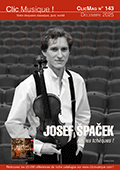 Chez Luigi Nono, Prométhée n’est pas ce héros qui transmet le feu et la technologie à l’humanité, mais plutôt celui qui n’accepte rien comme tel, surtout ce qui est conforme ou imposé, qui est en recherche incessante de profondeur, toujours nouvelle, insaisissable. Dans cet opéra insolite, qui ne donne rien à voir, mais tout à entendre - « tragédie de l’écoute » est son sous-titre -, le compositeur, après ses années de combat et d’engagement, pousse un pas plus loin sa recherche sur la finalité de l’art, le sens de la musique. Rien n’est raconté, ni représenté, afin de ne pas compromettre l’écoute, privilégiée dans ce qu’elle a d’habileté, de capacité profonde à saisir les divers types de sons, les arrivées, les départs - car « la qualité du son est fondamentale, bien plus que sa substance » -, une invitation à refuser toute réalité préconçue. Outre les voix et le dispositif électronique en temps réel, le Filarmonica Arturo Toscanini s’est scindé en quatre - un instrument de chaque pupitre dans chaque groupe -, pour orchestrer cette partition de sons mouvants, elliptiques, impalpables parfois, rebutants pour certains, d’une magie sans fin pour qui tend l’oreille avec appétence et indépendance. (Bernard Vincken)  Considered unanimously as one of the peaks of post-war opera, Prometeo was the acme of Nono’s research, begun towards the end of the 1960s, about the sense of making music and the very aim of art, in conjunction with the reflective withdrawal of its expressive instruments and musical contents after his combative years of “commitment”. After a four-year elaboration work, in close cooperation with Massimo Cacciari, who edited the libretto and inspired most of its conceptual structure, the opera debuted on 25th September 1984, under the baton of Claudio Abbado, in San Lorenzo’s deconsecrated church in Venice, where Renzo Piano had created an enormous wooden structure similar to a ship, or the soundbox of a huge lute, to accomodate the audience. Around it, at different distances from the floor and on the structure itself, the musicians moved, with very few visual effects created on purpose by Emilio Vedova. After a deep revision, the opera was staged in a definitive version exactly a year later, in the Ansaldo industrial plant, in Milan. Prometeo is a work that refuses to relate, to represent, to compromise the listening with scenography precisely because it was born with a will to explore and stimulate a deeper ability of listening, that was supposed to be, actually, an invitation not to accept any preconceived reality. The libretto itself does not aim simply to narrate the story of Prometheus, but to evoke it through a dense net of quotations in three languages within autonomous segments that refer back to ancient theatre and quantified, roaming perception (Prologue, interludes, stasima, islands). On this basis, Nono set up a score of unprecedented, off-putting, movable and encircling sounds, often bordering on silence, manipulated by live electronics, so as to make the space tangible by eliminating the direct and conventional relationship with the drama, crushed – as in a profound reconsideration of Renaissance polyphony – between reciting voices, choir and solo singers, whose texts are never pronounced or sung in a conventional way. It is therefore a drama of sounds, neither of actors nor of characters: the “tragedy of listening” should be understood as the ability to seize what happens in a unique, unrepeatable moment, which exhorts us each time to overcome our limited knowledge without taking anything for granted. Nono’s Prometheus is not the hero who gives humankind fire and practical knowledge, that is technology. He is, instead, the one who doesn’t accept anything as a fact, what is conforming or imposed, who is in a continuous, unsuccessful search for something deep and, each time, new and elusive.
 |
